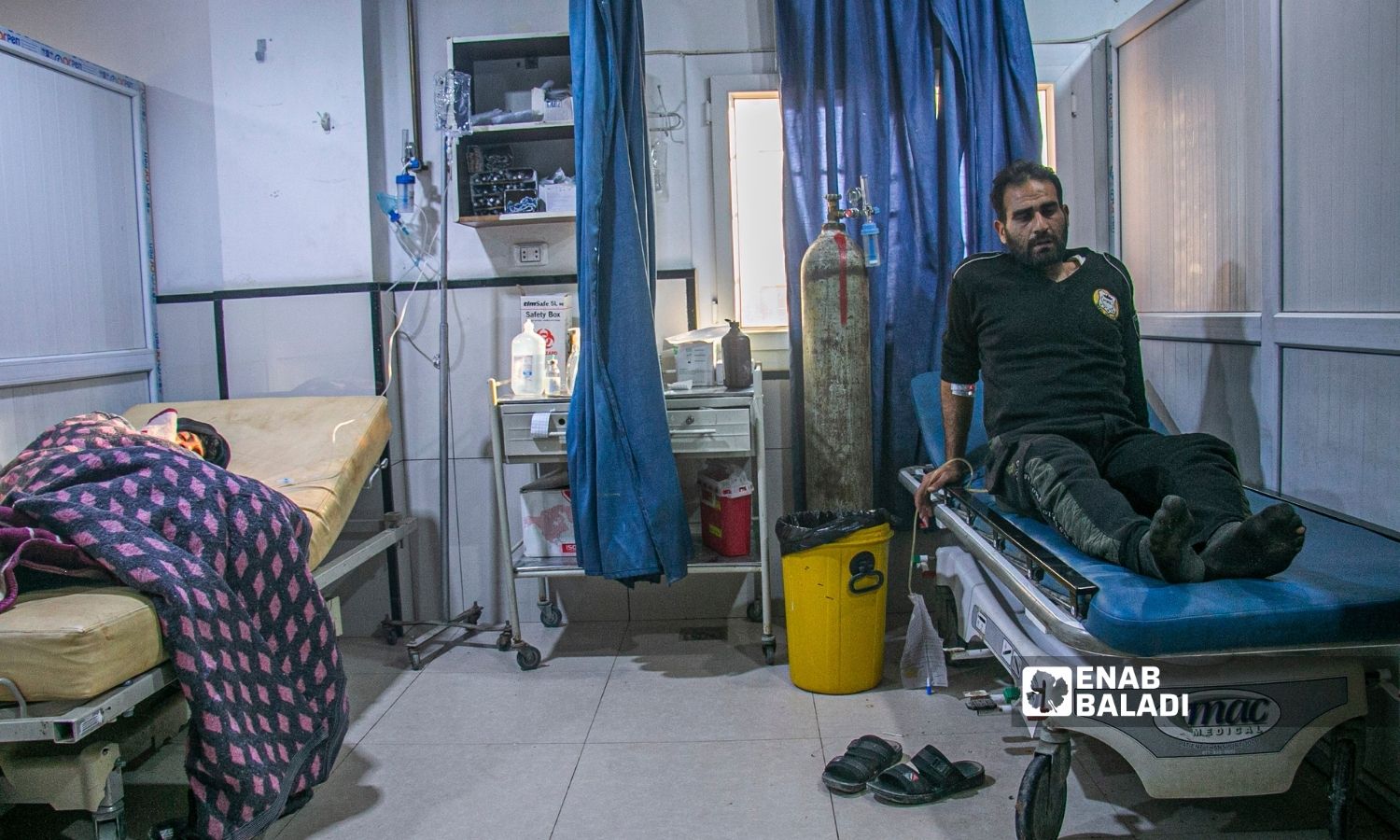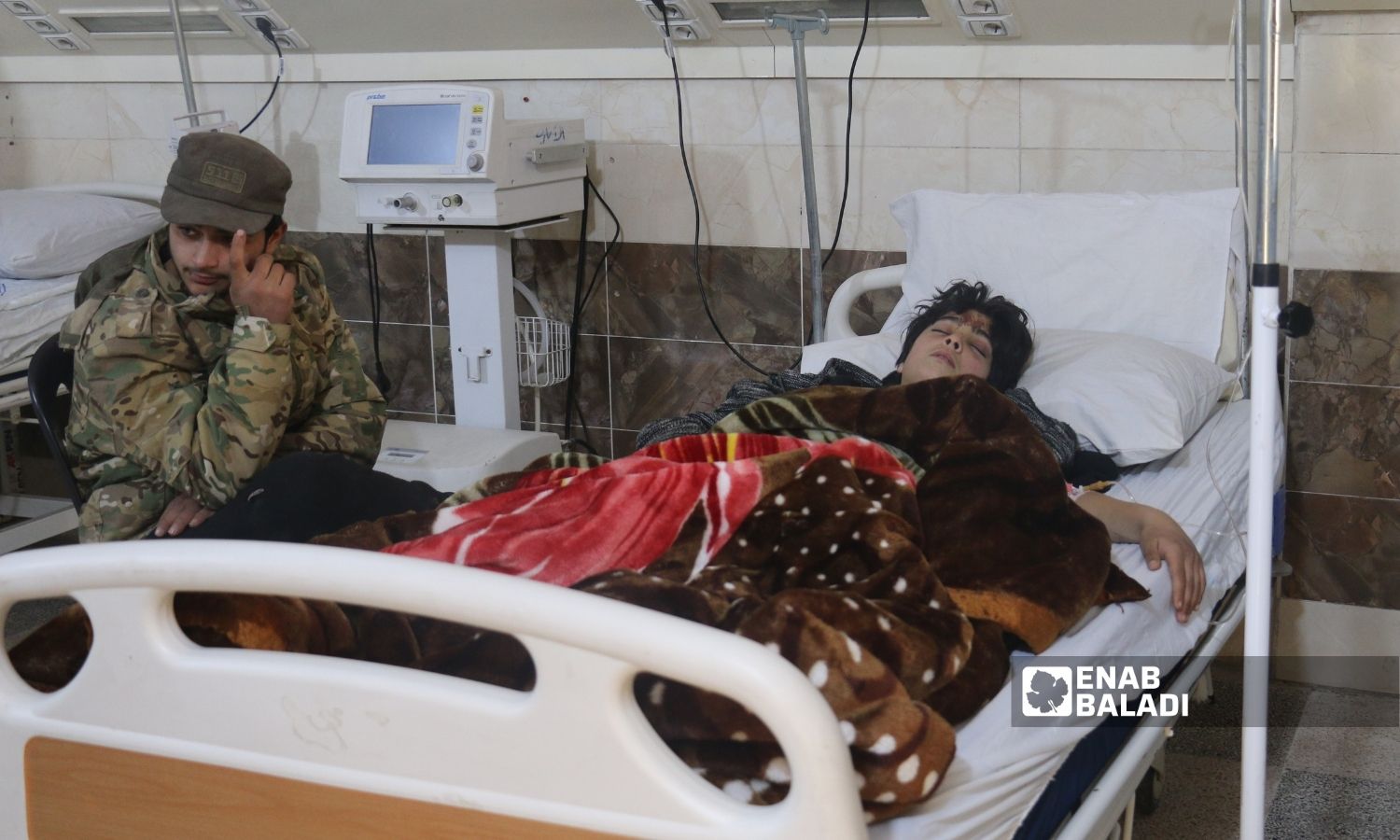



For the fifth day since the devastating earthquake, the medical sector in northwestern Syria continues to work at its maximum capacity and according to its limited capabilities, in response to the doubling of the number of injuries resulting from the earthquake that struck the region on Monday, February 6, leaving over 21,000 people dead.
According to several local sources working in the health sector, the lack of medical aid and coverage of the necessary needs threatens the complete collapse of the sector’s system, which threatens the lives of hundreds of those affected by the earthquake.
Munther al-Khalil, a doctor researching a research project to strengthen the health system in northern Syria, and the former Idlib health director, told Enab Baladi that the medical facilities, in general, made a tremendous effort to save the injured during the past hours, amid several challenges facing the sector in general.
Among the most prominent of these challenges is the medical staff themselves, some of whom were forced not to join their work because their family was affected by the earthquake, either in Turkey or in northwestern Syria.
This forced the rest of the staff to be few in number and to commit to performing their duties from the first hours of the earthquake until now, in order to absorb the large number of injuries, according to al-Khalil.
The doctor says that the logistical obstacles during the past few days were primarily represented by the absence of electricity, which was naturally reaching the region from Turkey, forcing hospitals and health centers to rely on diesel to run generators, which is one of the things for which precautions were not taken.
During the first three days, the fuel needs of the medical sector were considered sufficient, but starting from the fourth day, fuel shortages will begin to appear clearly due to the almost complete use of stocks, which will mainly affect oxygen generators.
The health sector in northwestern Syria needs certain types of medicines, the most important of which are antibiotics, as a result of the huge number of patients received by hospitals that are not equipped to serve this number, al-Khalil says.
The doctor explained that the patients’ failure to obtain this type of medication upon arrival at the hospital will expose them to subsequent infections, which will be very damaging for patients’ health in the future.

Quake-injured people in al-Shifaa Hospital in Afrin city – February 9, 2023 (Enab Baladi/Dayan Junpaz)
The response of the medical sector during the first seventy hours of the earthquake should be good, and it is very important at this time, Dr. Munther al-Khalil explained to Enab Baladi,
However, gaps will begin to appear when the existing stocks of diesel, medicines and surgical disposables are used up, he said.
Al-Khalil added that the response to aid must be very fast at the present time, pointing out that the response of international institutions in this context usually comes after missing the golden opportunity for rescue.
For the medical sector, the “golden opportunity for rescue” is the first week of the disaster, because the injured who are rescued at the first moment do not necessarily undergo surgeries, as the extent of the damage may not appear at the time.

Quake-injured people in al-Shifaa Hospital in Afrin city – February 9, 2023 (Enab Baladi/Dayan Junpaz)
Doctor Abd al-Rahman al-Omar, of the Syrian American Medical Society, that operates in northern Syria, said most of the injuries that reached SAMS hospitals during the four days of the earthquake were mainly traumatic injuries, including orthopedic injuries and neurosurgical conditions.
Al-Omar told Enab Baladi that all the people who survived under the rubble experienced what is called “crush injury” which is a very serious medical condition, as a result of pressure on their limbs and parts of their body, and if their health condition is not properly managed, they end up with kidney failure that may cost them their lives.
During the first days of the catastrophic earthquake, all hospitals in northwestern Syria were filled with patients, a number of them were placed in hospital corridors as a result of the arrival of a “large” number of injuries that exceeded the health sector capacity. By providing services, hospitals have exhausted many of their resources of medicines and medical consumables that were allocated for regular projects.
SAMS hospitals in the region used their resources, which were planned to be consumed for six months before the earthquake, in just one day, according to al-Omar,
He also stressed that the absence of electricity was an additional challenge for the sector in general, which now requires securing large quantities of fuel to secure the operation of hospitals, including equipment necessary to perform surgeries, mechanical ventilators and others.
Hospitals’ needs have multiplied after the earthquake, as a result of their consumption to treat patients with “crush injury,” says Doctor al-Omar, who notes that hospitals were mainly suffering from a shortage of dialysis equipment before the earthquake. As well as various surgical consumables, including orthopedic and nerve, and various consumables such as medical cotton, sterilizers, external and internal fixators, gypsum, splints, and other materials, some of which are no longer available, the doctor added.
The catastrophic earthquake has killed more than 21,000 people in Turkey and Syria as the possibility of finding more survivors is rapidly shrinking.
Turkey’s earthquake deaths reached 18,991 today, Friday 10th.
In the latest statistics issued by the Syria Civil Defense teams (The White Helmets), the death toll from the earthquake in northwestern Syria has risen to more than 2,030 deaths, and more than 2,950 injured, with the number expected to increase “significantly” due to the presence of hundreds of families under the rubble and the lack of humanitarian support for ongoing relief work in the region.
In regime-held areas, the latest statistics of the regime’s health ministry showed that the death toll reached a total of 1,374 while 2,295 people have been injured.

Quake-injured people in al-Shifaa Hospital in Afrin city – February 9, 2023 (Enab Baladi/Dayan Junpaz)
if you think the article contain wrong information or you have additional details Send Correction